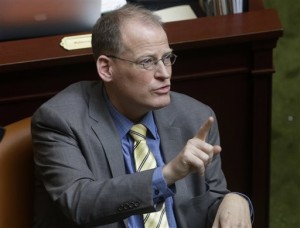SALT LAKE CITY — A Heber City lawmaker has riled some LGBT rights groups because he wants to give adoption preferences to heterosexual couples over gay couples.
Republican Rep. Kraig Powell believes that when it comes to adoption, straight couples should be granted preference of custody of children over gay couples. Powell believes that children who are raised in couples with both a father and mother figure are better served than those with same-gender parents.

The proposed bill comes as a result of the U.S. Supreme Court’s ruling that legalized same-sex marriage. Before the Supreme Court’s ruling, Utah law did not allow couples cohabiting in a non-legal relationship to adopt.
With the legalization of gay marriage, gay couples may now adopt. Powell believes that traditional families, with the influence of both a mother and father are the ideal for children.
If passed, the bill would give preference only to state adoptions and not to privatized adoptions. Additionally preference would still be granted to same-gender couples who have a prior-relationship with the child (such as family relationships).
Powell’s draft of the bill has yet to be released but has already received sharp criticism.
Troy Williams of Equality Utah, an organization that promotes LGBT rights in the state, argued that Powell’s bill is unconstitutional.
“Gay parents have equal protection now under the law,” Williams said. “Any effort by Rep. Powell to roll back the rights and liberties of LGBT Utahns will be met with fierce resistance from our community.”
Lynn Wardle, a law professor at BYU and has decades of research in family law, supports an update in the state code.
Wardle said, “It’s best to be raised by a mother and father that are in a stable relationship with the input of a male perspective different from a female perspective.”
Wardle recognizes the differences in men and women are often broad generalizations. However, Wardle holds that these generalizations are generally true. Wardle recognizes that in todays changing society, non-traditional family unites are becoming more the norm.
“(These non-traditional) relationships are not as promising (for raising children) but the law doesn’t want to ignore them anymore,” Wardle said. “The issue now is how to balance the need of reality, even though you want to promote the ideal.”
Posted Feb. 5, 2016




